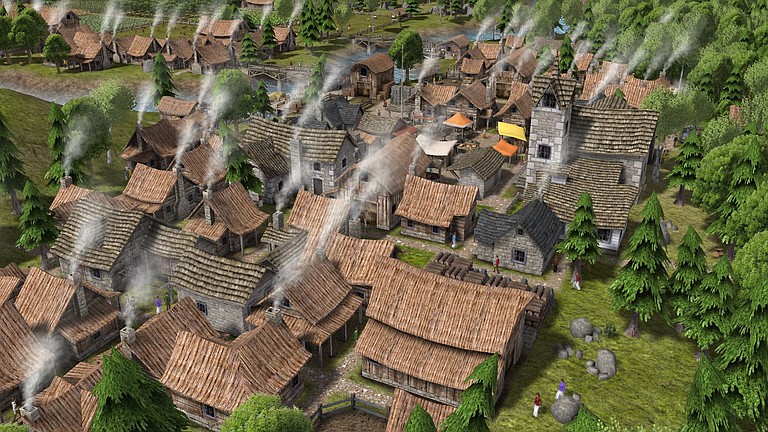Wednesday, March 12, 2014
Banished
Platforms: PC
The challenge of a good city builder is all in the planning. Never is the player expected to react on the fly—that's the domain of real-time strategy. No, what tests us is our ability to see a plan come together, to make a budget that funds an empire or to craft a distribution system that feeds a city. Complexity is the bread and butter of these titles, and recent years have seen no shortage of that, whether in the ecological factions of the futuristic Anno 2070 or the endless charts and services to be managed in the modern iterations of "SimCity."
"Banished" takes a different tack: remarkable simplicity. A one-man project under the banner of Shining Rock Games, there's nothing particularly revolutionary about the design or implementation of the technology. Banished is a small-scale city builder. Your village will begin with a few families and will top out at a few hundred, and you're just as likely to watch your first settlement wither and die before you ever see so much as a town hall.
The theme of "Banished" is survival: As the title suggests, your people have been exiled from their ancestral home and must find a place in the wild to found a new village. There is no campaign, no plot, no contact with the outside world save for the occasional appearance of river traders.
Unpretentious is an understatement: even for the relatively no-nonsense city builder genre, "Banished" is spartan. The challenge, then, is not making your city sprawling and profitable, as "SimCity" would have it; or luxurious and mighty, as the fantastic Caesar series instructs, but merely to survive.
There's a simple cycle to "Banished." The villagers need food—foraged, grown or traded—homes to protect them from the elements, and firewood in the winter for heat. They need tools to remain efficient—iron or steel, to be replaced every few years—clothes to keep them warm outside, herbs and doctors to keep them healthy, and wine and religion to keep them happy.
And critically important to "Banished" is the concept of scarcity. Clear-cut the forests and they will die, and likely your village with them. Strip-mine the mountains, and stone and iron will need to come from somewhere else. There's no easy answer for a paucity of resources in "Banished."
So the cycle goes. Your foresters keep the woodlands healthy, your gatherers and farmers keep the people fed. Each home produces offspring, who in time demand their own homes in which to begin families. These new families require more resources: more farms, more carefully preened forests, more fuel to keep them warm in the winter. Expand too quickly, and the storehouses will run empty. Famine culls your workers, which only causes more famine. Expand too slowly, and your population will age childless in their parents' homes, leading to an elder boom that will similarly cripple your economy as one by one they die.
This cycle defines "Banished" as a game that quickly reveals itself, beneath its quaint exterior, to be a brutal, unforgiving picture of frontier life, a tenuous balancing act between growth and death. This game will frustrate and infuriate you, leaving you with anxious unease in its summers and outright despair in its winters. Your reward will be subtle—nothing triumphant and marbled, or colossal and sprawling, merely a quiet, strikingly organic village in the wilderness, a church or a market the smallest signs of prosperity. There's something beautiful about that, and it makes "Banished" an experience to be savored.

Comments
Use the comment form below to begin a discussion about this content.
Sign in to comment
Or login with:
OpenID